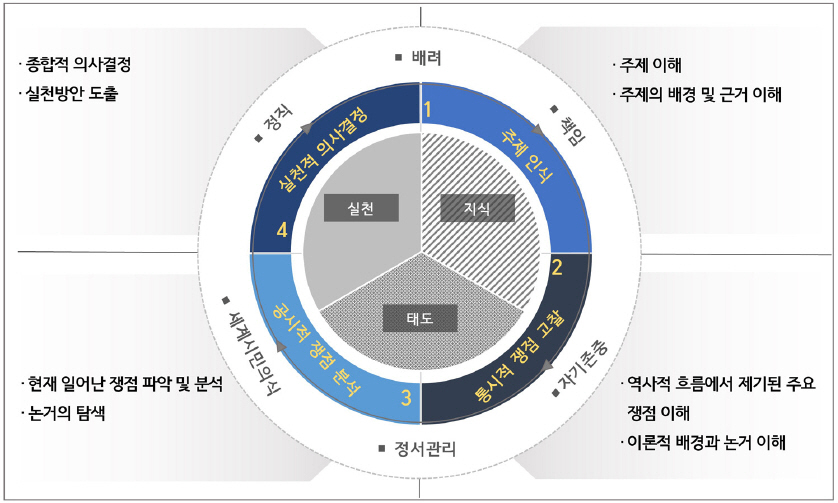Cha, G. S(2000). Social studies curriculum and guidance (21st century), HakMunsa.
[차경수. (2000). 사회과 교육과정과 지도법(21세기). 학문사.].
Cho, J, Go, J(2021). The analysis on educational efficacy of online humanity education based on classics, Journal of Korean Philosophical History 71:255-302.
[조재형, 고재석. (2021). 코로나 시대 고전기반 온라인 인성교육 교육효과성 분석. 한국철학논집, 71, 255-302.].
Choi, Y(2022). The effects of college freshmen's participation in personality education on ego-resilience and adjustment to college life, Journal of Education &Culture 28(1), 81-95.
[최연화. (2022) 대학 신입생의 인성교육 참여가 자아탄력성과 대학생활 적응에 미치는 효과. 교육문화연구, 28(1), 81-95.] .
Han, S(2017 Study of structural relationship between college students'self-esteem, character and academic life satisfaction,
Journal of Learner-Centered Curriculum and Instruction 17(2), 453-469.
https://doi.org/10.22251/jlcci.2017.17.2.453.

Ju, Y, Park, H, Kim, S(2018 The effect of personality education program on social interaction anxiety and subjective wellbeing of female college students:Focusing on the S Womens University Camp Program,
Journal of Moral &Ethics Education 61:135-158.
https://doi.org/10.18338/kojmee.2018..61.135.

Kim, E(2022). The effects of character education program based on self-reflection using a liberal-arts course at university, International Journal of Contents 22(2), 294-304.
[김은진. (2022). 대학 교양강좌를 이용한 자기성찰 기반 인성 교육 프로그램의 효과. 한국콘텐츠학회논문지, 22(2), 294-304.].
Kim, S, Chan, H(2020 Development and validation of a personality inventory for university students -Based on the case of K University,
Korean Journal of General Education 14(4), 53-66.
https://doi.org/10.46392/kjge.2020.14.4.53.

Ko, M, Kwon, M(2015). Effectiveness of a character education program developed for junior college students, Korean Journal of the Learning Sciences 9(1), 1-20.
[고명희, 권미진. (2015). 전문대학생을 위한 인성교육프로그
램 개발 연구. 학습과학연구, 9(1), 1-20.].
Koo, O, Ryu, Y(2018). The influence of ethical values and ethical sensitivity on character of nursing students, Journal of Digital Convergence 16(9), 219-218.
[구옥희, 유영미. (2018) 윤리적 가치관과 윤리적 민감성이 간호대학생의 인성에 미치는 영향. 한국디지털정책학회논문지, 16(9), 219-218.].
Koo, J(1999). Issue-centered instruction and achieving levels in social studies, Theory and Research in Citizenship Education 29:1-16.
[구정화. (1999). 사회과 학업수준별 논쟁문제 인식 및 수업에 관한 연구. 시민교육연구, 29, 1-16..
Lee, H, Park, H(2017 Multiple mediated effects of self-esteem and self-awareness in the relations between personality and mental health,
Journal of Educational Studies 48(2), 115-139.
https://doi.org/10.15854/jes.2017.06.48.2.115.

Lee, K(2002). The role of teacher and student`s achievement on teaching controversial issues in social studies, Theory and Research in Citizenship Education 34(1), 229-250.
[이광성. (2002). 교사의 역할에 따른 논쟁문제 학습의 효과 연구. 시민교육연구, 34(1), 229-250.].
Lee, K(2021 An analysis of research trends about personality education of university published in Korean journal articles,
Journal of Learner-Centered Curriculum and Instruction 21(1), 1579-1599.
https://doi.org/10.22251/jlcci.2021.21.1.1579].

Lee, N(2018). Analysis of the structural relationship among self-esteem, Sociality, morality, citizenship and character of university students, Korean Journal of General Education 12(6), 267-286.
[이난. (2018). 대학생의 자아존중감, 사회성, 도덕성, 시민성 및 인성의 구조적 관계분석. 교양교육연구, 12(6), 267-286.].
Lee, S. J(2003). The effects of issue-centered instruction in social studies on critical thinking and learning attitude, [Doctoral dissertation, Seoul National University]. ref.
[이순재. (2003). 사회과 쟁점중심 수업이 비판적 사고 및 학습태도에 미치는 효과 [박사학위논문, 서울대학교].].
Lee, Y, Kang, H, Kim, S(2013). A validation study of the character index instrument for college students, Journal of Ethics Education Studies 31:261-282.
[이윤선, 강혜영, 김소정. (2013). 대학생 인성 검사도구 타당화 연구. 윤리교육연구, 31, 261-282.].
Lee, H, Rhee, H(2019 A study of the features of university students'science- and technology-related character and values according to major and gender groups,
Journal of Educational Studies 50(3), 107-130.
https://doi.org/10.15854/jes.2019.9.50.3.107.

Moon, J, H, Ha, S. K(2019 The relationship among character, self-control, courage, agreeableness, and honesty-humility of college students,
Journal of Learner-Centered Curriculum and Instruction 19(7), 265-284.
https://doi.org/10.22251/jlcci.2019.19.7.265.

Moon, J. H, Kim, E. K(2021 Analysis of the effectiveness of a general education course in personality education centered on ethics of life practice,
Korean Journal of General Education 15(6), 147-161.
https://doi.org/10.46392/kjge.2021.15.6.147.

Nam, S. J(1995). Theory of environmental education, DaeHaksa.
[남상준. (1995). 환경교육론. 대학사.].
Noh, G. J, Gu, J. H, Cho, Y. J, Ju, E. K(2001). Theory and practice of education on debate issues, WonMisa.
[노경주, 구정화, 조영제, 주은옥. (2001). 논쟁문제 교육의 이론과 실제. 원미사.].
Noh, Y. K(2016). The effects of a character education program in a college liberal arts course, Journal of Human Understanding and Counseling 37(2), 115-138.
[노이경. (2016). 대학의 교양과목을 활용한 인성교육 프로그램의 효과연구. 인간이해, 37(2), 115-138.].
Oh, Y(2004). An analysis of the intellectual processes of middle school students'legal perspective takings on the public issues from the viewpoint of legal development theory, Social Studies Education 43(4), 55-83.
[오연주. (2004). 공공쟁점 토론과정에서 중학생이 채택하는 법적 관점의 분석. 사회과교육, 43(4), 53-83..
Park, G. Y(2000). A Study on the relationship between critical thinking and representative panel debate in issues-centered social studies, [Doctoral dissertation, Korea National university of Education].
[박강용. (2000). 쟁점중심 사회과에서의 패널식 대의 토론학습과 비판적 사고력의 신장 [박사학위논문, 한국교원대학교].].
Park, M(2019). Effects of personality education program for the university student's self-esteem, commnicative competence, and interpersonal competence, Korean Journal of General Education 13(3), 77-95.
[박미랑. (2019). 자아존중감, 의사소통능력, 대인관계능력 향상을 위한 대학생 인성교육 프로그램의 효과연구. 교양교육연구, 13(3), 77-95.].
Park, J, Park, J(2022 An analysis of the trends in character education in university using topic modeling with big data news,
Korean Journal of General Education 16(3), 29-41.
https://doi.org/10.46392/kjge.2022.16.3.29.

Pearson, Q, Nicholson, J(2000). Comprehensive character education in the elementary school:Strategies for administrators, teachers, and counselors,
The Journal of Humanistic Counseling, Education and Development 38(4), 243-251.

Seo, Y, Koh, M(2013). A case study on character education applying project based learning, Korean Journal of the Learning Sciences 7(1), 49-77.
[서윤경, 고명희. (2013). 프로젝트 중심 학습을 적용한 실천 중심의 인성교육 프로그램 개발 및 운영 사례. 학습과학연구, 7(1), 49-77.].
Seol, K(2001). The 'conflict resolution'-centered unification education using the controversial issues in social studies, Theory and Research in Citizenship Education 33:163-190.
[설규주. (2001). 사회과 논쟁문제 학습. 시민교육연구, 33, 163-190.].









